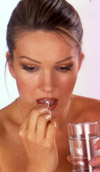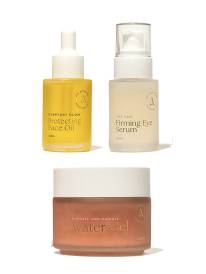Vitamins - what are they?

Vitamins are compounds that are essential in small amounts for the normal functioning of the body. They are present in much of the food we eat (especially if your diet does not consist largely of junk food and take always). The vitamin levels within the body must be maintained for optimal functioning.
OK, so you know that vitamins are important. But why are they so important and what should you be doing to maintain your vitamin levels?
To understand the above question, we need to know the following:
Vitamins are broken up into 2 groups:
The water-soluble vitamins: Vitamin C and the B group
and
The fat-soluble vitamins: Vitamins A, D, E and K.
WATER SOLUBLE VITAMINS
This group of vitamins consists of vitamin C and the B group vitamins (B1, B2, B6, B9, B12, B17). They are soluble in water and the majority of vitamin C and B are excreted during urination from the body. Thus they are required everyday in relatively high amounts.
Vitamin C:
Also known as ascorbic acid.
Found in: citrus fruits, tomatoes, berries, tomatoes, potatoes, fresh green and leafy vegetables, including cabbage, sweet bell peppers, brussel sprouts, and parsley.
Uses: Needed for the formation of tissue material in the teeth, bone, cartilage and skin. Also strengthens blood vessel walls and helps fight of infections (eg. Colds and flu's).
Signs of deficiency: bleeding gums, tendency to bruise, nosebleeds, low resistance to infections, slow healing of wounds. Severe deficiency leads to scurvy.
Signs of excess: burning sensation during urination, diarrhoea, and skin rash.
Vitamin B:
Commonly known as folic acid. This group will be treated as a whole and not as B1, B2 etc.
Found in: spinach, and other green leafy vegetables, asparagus, lima beans, nuts, whole-grain cereals, liver, and kidney.
Uses: increases appetite, required for cell growth (production of tissue, skin)
Signs of deficiency: Poor growth, graying of hair (!!), anaemia
FAT SOLUBLE VITAMINS
The fat-soluble vitamins are, as the name suggests, fat-soluble. They require the presence of free fat (fat just eaten) in the body to be digested. This is why everyone MUST consume some amount of fat per day, otherwise deficiencies might occur.
Vitamin A:
Found in: fish-liver oils especially cod liver oil, egg yolk, butterfat, leafy green vegetables, yellow fruits and vegetables (now you know why Bugs Bunny sees so well ~ joke), milk, cheese.
Uses: needed for healthy vision and for the maintenance of good skin
Signs of deficiency: Night blindness, skin problems
Signs of excess: fatigue, irritability, abdominal pains, joint pains, headaches, night sweats, loss of body hair, brittle nails.
Vitamin D:
Found in: sunlight (not found in sunlight, but rather sunlight helps make most of our vitamin D in the body), fish liver oils, saltwater fish, organ meats, and egg yoke.
Uses: normal formation of bones and teeth, for the absorption of calcium and phosphorous
Signs of deficiency: rickets in children, osteoporosis
Signs of excess: vomiting, headaches, drowsiness, sialorrhea, calcification (hardening) of the tissues of the heart, blood vessels and lungs
Vitamin E:
Found in: Wheat germ, soybean, peanut and corn oils, margarine, whole raw seeds and nuts, eggs, butter, liver, many vegetables
Uses: it is an antioxidant, essential for normal reproduction, muscle development, and for various other functions.
Signs of deficiency:(please note that deficiency is very rare) muscle degeneration, blood system problems, anaemia, infertility liver and kidney damage.
Vitamin K
Found in: leafy green vegetables, pork liver, egg yolk, yoghurt, alfalfa, fish-liver oils
Uses: essential for the proper functioning of the liver
Signs of deficiency: poor blood clotting, easy bleeding,
Signs of excess: may cause anaemia
- Michelle Palmer (michelle@girl.com.au)
OK, so you know that vitamins are important. But why are they so important and what should you be doing to maintain your vitamin levels?
To understand the above question, we need to know the following:
Vitamins are broken up into 2 groups:
The water-soluble vitamins: Vitamin C and the B group
and
The fat-soluble vitamins: Vitamins A, D, E and K.
WATER SOLUBLE VITAMINS
This group of vitamins consists of vitamin C and the B group vitamins (B1, B2, B6, B9, B12, B17). They are soluble in water and the majority of vitamin C and B are excreted during urination from the body. Thus they are required everyday in relatively high amounts.
Vitamin C:
Also known as ascorbic acid.
Found in: citrus fruits, tomatoes, berries, tomatoes, potatoes, fresh green and leafy vegetables, including cabbage, sweet bell peppers, brussel sprouts, and parsley.
Uses: Needed for the formation of tissue material in the teeth, bone, cartilage and skin. Also strengthens blood vessel walls and helps fight of infections (eg. Colds and flu's).
Signs of deficiency: bleeding gums, tendency to bruise, nosebleeds, low resistance to infections, slow healing of wounds. Severe deficiency leads to scurvy.
Signs of excess: burning sensation during urination, diarrhoea, and skin rash.
Vitamin B:
Commonly known as folic acid. This group will be treated as a whole and not as B1, B2 etc.
Found in: spinach, and other green leafy vegetables, asparagus, lima beans, nuts, whole-grain cereals, liver, and kidney.
Uses: increases appetite, required for cell growth (production of tissue, skin)
Signs of deficiency: Poor growth, graying of hair (!!), anaemia
FAT SOLUBLE VITAMINS
The fat-soluble vitamins are, as the name suggests, fat-soluble. They require the presence of free fat (fat just eaten) in the body to be digested. This is why everyone MUST consume some amount of fat per day, otherwise deficiencies might occur.
Vitamin A:
Found in: fish-liver oils especially cod liver oil, egg yolk, butterfat, leafy green vegetables, yellow fruits and vegetables (now you know why Bugs Bunny sees so well ~ joke), milk, cheese.
Uses: needed for healthy vision and for the maintenance of good skin
Signs of deficiency: Night blindness, skin problems
Signs of excess: fatigue, irritability, abdominal pains, joint pains, headaches, night sweats, loss of body hair, brittle nails.
Vitamin D:
Found in: sunlight (not found in sunlight, but rather sunlight helps make most of our vitamin D in the body), fish liver oils, saltwater fish, organ meats, and egg yoke.
Uses: normal formation of bones and teeth, for the absorption of calcium and phosphorous
Signs of deficiency: rickets in children, osteoporosis
Signs of excess: vomiting, headaches, drowsiness, sialorrhea, calcification (hardening) of the tissues of the heart, blood vessels and lungs
Vitamin E:
Found in: Wheat germ, soybean, peanut and corn oils, margarine, whole raw seeds and nuts, eggs, butter, liver, many vegetables
Uses: it is an antioxidant, essential for normal reproduction, muscle development, and for various other functions.
Signs of deficiency:(please note that deficiency is very rare) muscle degeneration, blood system problems, anaemia, infertility liver and kidney damage.
Vitamin K
Found in: leafy green vegetables, pork liver, egg yolk, yoghurt, alfalfa, fish-liver oils
Uses: essential for the proper functioning of the liver
Signs of deficiency: poor blood clotting, easy bleeding,
Signs of excess: may cause anaemia
- Michelle Palmer (michelle@girl.com.au)
MORE





